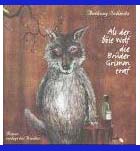
About Darkest Desire
PUBLISHED IN 1998 by Ecco, this was a novel that left few readers indifferent. Reviewers loved it (Minneapolis StarTribune) or hated it (New York Times). Darkest Desire was published in Japan, somewhat inexplicably, as a young adult title. In Germany it was published as a coffee-table book with original color art tipped-in throughout the text and numerous artist-drawn chapter and section dividers. The novel sold in Italy, though it was never published there. The film rights were optioned several times by a US production company.
Reviews
Who's afraid ...?
By Chris Waddington; Staff Writer
Minneapolis StarTribune, Dec. 27, 1998
 A TALKING wolf, the devil, dark woods and two scholars caught on a trail at nightfall: If these sound like the makings of a children's story, be warned that when they appear in Anthony Schmitz's brilliant, brief novel "Darkest Desire: The Wolf's Own Tale," they attain a philosophical resonance uncommon in contemporary literature.
A TALKING wolf, the devil, dark woods and two scholars caught on a trail at nightfall: If these sound like the makings of a children's story, be warned that when they appear in Anthony Schmitz's brilliant, brief novel "Darkest Desire: The Wolf's Own Tale," they attain a philosophical resonance uncommon in contemporary literature.
Breaking the chains of naturalism that bind so many novelists, this St. Paul writer has produced a text with the narrative velocity of the best folk tales. Yet "Darkest Desire" also offers a vivid psychological portrait, witty dialogue worthy of the stage and sharp meditations on the nature of desire and the hopelessness of self-improvement schemes.
Schmitz's story begins when Wolf - a lone creature ostracized for his habit of gobbling children - encounters Wilhelm and Jacob Grimm, the famous brothers who compiled and edited folk tales in 19th-century Germany. The meeting is a surprise for both parties: Wolf finds men whose scholarly interests triumph over fear, and the Grimms - who initially expect to be eaten - find themselves conversing with a creature claiming to "have higher thoughts, like anyone else."
If the reader suspends disbelief, it's because Schmitz sustains such a consistent, utterly plausible voice for Wolf. When one brother stretches, Wolf hears joints cracking and "can easily imagine the joints and tendons laid bare, see the wondrous fit of ball in socket." Yet this animal attuned to all things physical also notes that one "feels defiled after a kill, licking the caked sticky blood from one's fur."
 In a tour de force of first-person narration, Schmitz captures the drift of thought, the self-doubts, the wit and analytical mind of a creature who seems a fanged cousin to philosopher Jean-Jacques Rousseau. Like that 18th-century Frenchman who embodied all that's good and bad in the modern spirit, Wolf wanders the woods and the dark places of the heart, his character a perverse compound of cruelty and sentiment, his role that of outcast, his hopes tied to the confessional impulse.
In a tour de force of first-person narration, Schmitz captures the drift of thought, the self-doubts, the wit and analytical mind of a creature who seems a fanged cousin to philosopher Jean-Jacques Rousseau. Like that 18th-century Frenchman who embodied all that's good and bad in the modern spirit, Wolf wanders the woods and the dark places of the heart, his character a perverse compound of cruelty and sentiment, his role that of outcast, his hopes tied to the confessional impulse.
Eating innocence
Ravenous as any real-life predator, Wolf is also a kind of seducer. He pads behind children in the woods, nuzzling their necks and " watching their shock turn to curiosity as they stare. I cock my head, lick their cheeks, try to make them understand. Look at the flowers, I suggest. Look at the trees so green and inviting. . . . We are all children of nature, made from the rot beneath the trees, living for our alloted time and returning to rot. . . . There is no need to struggle. Why fight that which is most natural?"
Asked what it was like to kill a child for the first time, Wolf thinks of this forbidden pleasure in a manner recognizable to any adult who has ever yielded to temptation: "I have heard the highwaymen declare that the first time is the sweetest in matters of the flesh. Do I agree? I am not so sure. . . The tenth or twentieth or thirtieth time is better, I maintain. One knows what to expect, but is still excited by the nuance. . . . Then, too, one's scruples are worn down with use. What was a moral extravagance becomes normal. One learns how to live with oneself, to forget that it was once any other way."
Such talk horrifies Wilhelm Grimm, the father of several children. But the Grimms remain with Wolf, in order to gain knowledge and, perhaps, to play a fatal trick on their subject. From Wolf they coax a confession of regret. They, in turn, offer their scholarly services, in an effort to cure his murderous ways.
"I wonder how my life should seem if I were cured," Wolf wonders. "Would I prefer the satisfactions of virtue to the joy of my perversion? If I am cured and miserable, then what sort of cure is that?"
Wolf in therapy
Wolf submits to the "cure" out of desperation and a loneliness that makes him susceptible to the doggy pleasures of a scratched belly and a place beside the Grimms' feet.
His ensuing attempts at reform let Schmitz parody the contemporary culture of self-improvement, in which every quirk of our individual nature is defined as a symptom to be treated. Thus, Wolf's exchanges with the Grimms sometimes resemble those between patient and therapist:
"Talk without thinking if you can. Let the words flow without measuring each," Jacob urges.
Later the Grimms dress Wolf in fairy-tale costumes, tempt him with a house full of children and put him through role-playing exercises worthy of a human-potential seminar. "We have heightened the contradictions within your mind, and therefore pushed you closer to a transformation," Jacob intones.
But what if the Grimms are simply betraying him?
"I would end my days as a pelt nailed above the mantle," Wolf thinks. Worse yet, he could land in one of the Brothers' moralistic tales, "transformed from real flesh and blood - from a living creature with real feelings and thoughts and hopes - into some slavering fairy tale monster."
Fortunately for the reader, Schmitz himself never yields to such simplifying cliches. In Wolf, he has created a character of enduring adult complexity, leaving his fate undetermined until the last page of this remarkable novel.
Analyze This
By M. G. Lord
New York Times, March 21, 1999
PEOPLE who believe that ''ethical journalist'' is an oxymoron will love Anthony Schmitz's prickly novella, ''Darkest Desire: The Wolf's Own Tale.'' With the possible exception of ''The Journalist and the Murderer,'' by Janet Malcolm, no book is more fierce in its indictment of writers who ''climb on the backs of others'' to ''make their reputation.'' Schmitz's reporters are the brothers Grimm, Jacob and Wilhelm, a careerist pair of fairy tale collectors who will stop at nothing to get a story. Their prey, ironically, is the archetypal predator -- a child-eating wolf who, rather than have his tale distorted by the Grimms, chooses to narrate it himself.
Journalism may receive a drubbing in Schmitz's upended fairy story, but psychotherapy fares even worse. Schmitz suggests that if therapists had existed in the early 19th century, when the Grimms were in operation, licensing standards would have been even more lax than they are today. In ''Darkest Desire,'' anybody can hang out a shingle -- which the brothers do, recruiting the wolf as their first patient. Very soon, the beast, who is both drawn to and repulsed by his child-killing, must face the classic analysand's dilemma: ''Would I prefer the satisfaction of virtue to the joy of my perversion?'' the wolf asks. ''If I am cured and miserable, then what sort of cure is that?''
Had the wolf been conversant with the ways of psychotherapists, he might have smelled a rat early on. The Grimms propose to treat him without extorting immense hourly fees. Therapy, however, always exacts a price, and the Grimms, he later learns, intend for him to pay for it with his life.
Like many old fairy tales, ''Darkest Desire'' doesn't stint on explicit violence. In lurid, overripe language, the wolf explains why he finds child-murder thrillingly erotic. He describes his lust to ''press'' himself into the ''workings'' of his victims and even shares a moment of what seems like orgasm (or at least ''overwhelming joy'') when his ''teeth break through the skin, when the warm blood fills my mouth, when the nectar lights me from within.''
Schmitz (the author of a previous book, ''Lost Souls,'' and the editor and publisher of a monthly St. Paul newspaper, The Frogtown Times) started out with an inventive premise -- to tell a fairy tale from the wolf's point of view, to indict conformist therapies that would have the beast relinquish his individuality and to reprove the rapacious Grimms. Yet for the book to work as a satire, it must be set in an unreal world. The reader must be able to view the wolf's horrific urges in an abstract way in order to sympathize with him. For me, however, the wolf's ''perversion'' was entirely too real. Far from being charmed by him, as the author presumably intended, I was sickened.
Frequently, I also wondered who the target of Schmitz's critique might actually be. When, for example, Jacob tells the wolf, ''We hate the sin, not the sinner,'' he employs a phrase often applied by the religious right to behavior that is not, in the opinion of many other people, sinful at all, such as homosexual acts. But sexualized child-murder is unambiguously loathsome. Is Schmitz equating this practice with homosexuality? Or is he endorsing the intolerance of religious extremists? Schmitz also stacks the deck against nonconformity by having its proponent be Satan -- who is, to be sure, seductive, but Satan nevertheless.
I'm reluctant to suggest that a novel should support only a single reading. But it's hard to trust a book that lends itself so readily to such a distasteful interpretation. For all his evident sensitivity to words, is Schmitz a careless writer? Or something more dangerous, disguised in wolf's clothing?
M. G. Lord's most recent book is ''Forever Barbie: The Unauthorized Biography of a Real Doll.''